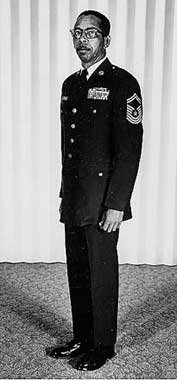
(DON THOMPSON / iNFOnews.ca)
June 05, 2017 - 12:30 PM
OPINION
I first met Fred Archer 45 years ago today in Zweibrucken, Germany. We were both in the U.S. Air Force. I was in my third year of a four-year hitch. He had 33 years and three wars under his belt...11 years and two wars longer than I had lived. Fred was a "lifer"...jargon for someone who spent most of his adult life in the military. He joined the New York National Guard in 1939, at just 17 years old, serving first in the infantry before going on active duty in the Army Air Corps in 1941.
Fred rose to Chief Master Sergeant - eight stripes on his sleeve - the Air Force's highest enlisted rank. I was a Sergeant - three stripes on my sleeve - one less than I would earn before my honourable discharge a year later in 1973. Fred retired in 1974 after 34 years of service to his country. Even though our military stints overlapped just a single year, we became fast friends. And to this day, I've met more famous people...but never a better man.
Fred was "Chief Archer" to me and his other friends...a man whose name and rank were inextricably woven. Chief Archer was a lanky, elegantly soft-spoken man with a Martini-dry sense of humour and a depth of kindness beyond that of most people. His looks and demeanor would remind me years later of Morgan Freeman's character, "Red" in the movie, "Shawshank Redemption."
Sometimes military life holds real advantages over civilian life. The military's degree of control over behaviour is unquestionable. However, attitudes are infinitely more difficult to control...even in the military.
So, I was surprised but supportive of the Air Force's decision in early 1972 to institute a revolutionary new program of race relations seminars for all officers and non-commissioned officers (NCOs). The plan called for 20-hour seminars over five consecutive half-days to facilitate open and honest discussions about race. How revolutionary was this? Well, consider such discussions are rare even today among American civilians.
I applied and was chosen as one of the 32 officers and NCOs who would develop the program for the Air Force. I co-authored and a led seminars at Zweibrucken Air Force Base in Germany. It was a life-changing experience for me...and remains my most challenging yet rewarding jobs.

Chief Master Sergeant Fred Archer
Image Credit: SUBMITTED
At 0800 hours on Monday, June 5, Chief Archer showed up as one of 20 seminar participants...the only African-American other than my fellow facilitator, Capt. Harv Cooper. The seminar went surprisingly well. Surprising because we had no history...we were navigating new space. We eschewed rank and wore civilian clothes during the seminar...pretty progressive concepts for the military and that era.
I talked with all the attendees during breaks, including Chief Archer, trying to get to know them better. But it was Friday during the last hour of the seminar that Chief Archer revealed himself...to me and everyone lucky enough to be in that room.
Chief Archer asked me during the morning's final coffee break if he might "have a few minutes to say something to the group." I didn't know what he had in mind, but I trusted that it would be worth hearing. It was.
First, some backstory. Chief Archer was the first African-American to rise to the rank of Chief Master Sergeant in the Air Force. He was hand-picked as a member of the 99th Pursuit Squadron, an all African-American fighting unit of fighter pilots and Airmen. He trained first at Chanute Field in Illinois and then in Tuskegee, Alabama, becoming one of the legendary Tuskegee Airmen.
A munitions and ordinance man, Chief Archer distinguished himself as a combat crew chief in Italy in 1943, before supporting bomber missions over France, Austria, Czechoslovakia, Poland, Greece and Yugoslavia in 1944 and 1945. By the time we met, he had won a chest full of medals, ribbons and citations.
That Friday morning, he spoke - not as a war hero - but as an African-American man trying to live the American Dream. His monologue was an eye-opener for everyone in the room. His words were quiet...measured. His tone was at times solemn, disbelieving, and yes, even humorous. He was never angry or vengeful or bitter.
He described events in his life in more-or-less chronological order...thoughtfully taking us through the decades. Chief Archer - born and raised in New York - lived through the "Harlem Renaissance," then called the "New Negro Movement." The social, cultural and artistic renaissance that centred in Harlem, however, faded quickly beyond the Hudson River.
He told fellow seminar attendees how he politely refused to ride in the backs of buses or in "Colored-Only" train cars when he was stationed throughout the South after WW II. Instead, he bought a car and relied, he said, on "The Negro Motorist Green-Book," an absolute necessity for African-Americans traveling by car in America. Why? Because African-Americans faced mostly white-owned businesses in largely segregationist states that refused to serve them...whether in need of accommodations, food or car repairs...even gasoline.
Threats were common, he told us, adding that he and his family would travel miles out of their way, zig-zagging to avoid whites-only, so-called "sundown towns"...places where the sun had better not set on you if you were a Negro.
He told us that during the war, Italian children and even adults would ask, "to see our tails," because white American soldiers told them "we were monkeys." This treatment was all-too-common, despite the 99th Pursuit Squadron's record of successful missions and bravery. Chief Archer's eyes would occasionally moisten during his talk, but again, his voice had no trace of vengeance or bitterness. The room was quiet...you could hear only your own heartbeat...though an air of shame was palpable.
Chief Archer moved forward in time...to 1949 when the 99th Pursuit Squadron was dissolved...a year after President Harry S. Truman ended segregation in the military...and two years after the Army Air Corps became the U.S. Air Force. Awaiting re-assignment, then-Staff Sergeant Archer served temporary duty transporting military prisoners. He told us that he and a Mexican-American Sergeant were sent from Randolph Air Force Base in Universal City, Texas to Santa Fe, New Mexico to pick up a white Airman who was absent without leave (AWOL).
After picking up the prisoner from jail, the three proceeded with military orders to the train station for the 16-hour trip back to Texas. But the station master informed Staff Sergeant Archer that there was a problem. Neither Staff Sergeant Archer nor the Mexican-American Sergeant could ride in the coach with the prisoner, he explained, because the prisoner was white...and they weren't. The entire train was delayed three hours before the area's military Provost Marshall decided that an extra car would be added to the train.
"So," said Chief Archer, "the three of us rode all the way back to Texas in our own private train car." Chief Archer somehow managed a chuckle of sorts...more about the "absurdity than the humour of the solution," he would later admit.
He continued the story of his life...rolling us forward to Seymour Johnson Air Force Base in Goldsboro, NC, in the early 1950s. Chief Archer's son, Steve, was starting elementary school. The family lived in on-base housing, a three-minute walk from the elementary school. But his young son was up earlier than the white kids on base for the half-hour bus ride to a Negro school off base.
Chief Archer - never raised his voice - preferring to battle obvious racism with logic and reason.
He met with the base commander and simply asked "if it seemed right for an American fighting man's child to suffer because of the colour of his skin?" Chief Archer knew it was a question for which there was only one answer. So, a decade before the Civil Rights Movement gained traction in the South...Chief Archer was helping right wrongs. Battling for equality was nothing new for him..
Chief Archer knew racism and discrimination flourished outside the South. When he arrived at Davis Monthan Air Force Base in Tucson, AZ, in 1949, as a Master Sergeant (six stripes), he was told he couldn't be a member of the Non-Commissioned Officer's (NCO) Club. He quietly applied, anyway, questioning the NCO Club's manager whether President Truman's Executive Order 9981 ended segregation..."in practice or only in theory." He was a member the next week.
Also, when he arrived at the base in Tucson, he was told by the personnel office: "We don't know what to do with you...you have too much rank to drive a garbage truck." He agreed, and waited a week before finally being assigned Non-Commissioned Officer in Charge (NCOIC) of the base's Armament Shop, what would have been a snap-decision had he been white.
Chief Archer's voice never wavered...never increased in volume during his talk. His eyes were clear and bright, though most eyes in that room welled. Chief Archer's "few words" took us nearly a half hour past the seminar's scheduled ending time. No one even noticed...spellbound by a man's simple and honest testament to why we should all get along.
He ended quoting President Abraham Lincoln's Gettysburg Address. The familiar words sounded different when Chief Archer uttered them, perhaps because of his emphasis.
"Government of the people, by the people, for the people, shall not perish from the Earth."
I asked Chief Archer to come every Friday and give his talk...to each week's seminar. It was one of my smartest decisions...because I knew his words magically started to change attitudes.
Chief Archer and I had more than a few conversations over the years...often over a glass of wine or beer and a meal...even after we were civilians. He died on my birthday in 1988...at age 67...my age this year. I'll raise a toast today - commemorating my good fortune in meeting this man 45 years ago - and again on my birthday, when the world lost a truly great man. Cheers, Chief Archer.
– Don Thompson, an American awaiting Canadian citizenship, lives in Vernon and in Florida. In a career that spans more than 40 years, Don has been a working journalist, a speechwriter and the CEO of an advertising and public relations firm. A passionate and compassionate man, he loves the written word as much as fine dinners with great wines. His essays are a blend of news reporting and opinion.
We welcome your comments and opinions on our stories but play nice. We won't censor or delete comments unless they contain off-topic statements or links, unnecessary vulgarity, false facts, spam or obviously fake profiles. If you have any concerns about what you see in comments, email the editor.
News from © iNFOnews, 2017